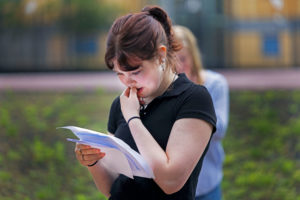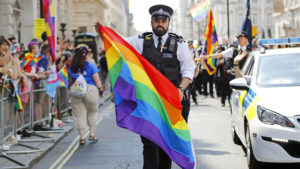People get very worked up about children’s books. In 1987, the Right-wing press stirred up a shameful moral panic about Jenny Lives with Eric and Martin, a harmless picture book that featured a gay couple and was kept on such a high shelf of a London library that almost no one had read it. The next year, the notorious Section 28 was ushered into law on the back of the fuss. I had just qualified as a teacher and promptly went, as we did so often then, on a demo against it.
We were right to shout. It was a nasty piece of legislation, a cruel, regressive swipe against the Gay Rights movement, a law so heinous it summoned Stonewall into existence. Maggie, Maggie, Maggie, Out, Out, Out. She was nearly gone, anyway. Section 28 was a hand from the grave, a grab at popularity from a government finding itself suddenly out of touch with its times.
But the scope of those zombie claws, at first, seemed scarily wide: no organisation funded by a local authority might “promote” homosexuality and schools in particular should not teach “the acceptability of homosexuality as a pretended family relationship”. What was that going to mean?
Today, the consequences are often recorded as extremely grave: the BBC teaches Section 28 as a prime cause of homophobic bullying, while Stonewall charts a dark age in schools: “Section 28 deprived generations of LGBT pupils the chance of seeing people like them in the books, plays, leaflets or films their schools could stock or show. Teachers weren’t allowed to teach about same-sex relationships; anyone who broke the law could face disciplinary action.”
Happily, that is not quite true. Certainly, there was far more homophobia in the Nineties, particularly in deprived communities. In my work I heard the word “gay” used by young people to disparage all sorts of artistic, experimental and gender non-conforming behaviour to the point that I sometimes felt my sole job was to combat it. But Section 28 was far from the only cause of that. I wasn’t restricted in what I could “stock or show”, either.
The English curriculum was much wider then and we routinely taught many texts and films representing gay people. The Colour Purple, Oranges are Not the Only Fruit, The Buddha of Suburbia and My Beautiful Laundrette were new and exciting in the Nineties and had great film versions. They soon joined Shakespeare’s Sonnets, Cat on a Hot Tin Roof, Thom Gunn and Oscar Wilde on the syllabus. It was common to start secondary school with gender-questioning texts The Turbulent Term of Tyke Tiler and Bill’s New Frock. The kindly anti-homophobia book Two Weeks with the Queen was popular too: I taught it in a working-class school in Scotland back in 1991.
At no point was I concerned that I or my colleagues would be disciplined or prosecuted for any of this. Section 28 , sneaked into law on the back of a local authority bill, turned out to be poorly framed. The NUT questioned in 1988 whether it actually applied to schools, and the Department of Education, remarkably, confirmed that it did not. Even if you had not heard of this pronouncement, it rapidly became clear that no one was able to say what “promoting” homosexuality was, and that no one wanted to be the test prosecutor for such a foolish notion, either. No case was ever brought to court.
Besides, we were all at it: my colleagues, my school, and my union. The whole “Blob”, as Michael Gove was later to call us — the entire irreducibly liberal education establishment — was in support of gay rights. When I taught Two Weeks with the Queen, for instance, it was not a piece of freelance activism but part of a project being run by the local authority, health service and teaching training college acting in concert. We were worried about AIDS, not Section 28.
Gove hated the Blob for being so large and so resistant to change and for always fudging everything and thinking the same woolly wet things. He was right: the Blob did think alike, and we were progressive, and soft round the edges.
Progressively and softly, the Blob killed Section 28 in schools many years before it came off the statute books: squished it to death with a million mild and thoughtful classroom interactions, with thousands of conversations about Shakespeare’s lovers, hundreds of performances of YMCA at assembly and courageous comings out, public and private. I think the Blob should be proud. Besides, wool and fudge are good for young people: they can be relied on to bring the absolutism and the knives themselves.
All this matters because the memory of Section 28 is increasingly being invoked around a new moral panic: the treatment of transgender young people in schools. There are parallels. In 1996 I thought, for example, that I would never see such run-down classrooms or desperate staff rooms again. But after the pandemic, and 12 years of conservative austerity — and the venal demands of the academy trusts — roofs are falling in again and classes are bulging at the seams. There is a huge teacher recruitment problem and an absolute crisis in Special Educational Needs. Here again is a populist government finding itself unexpectedly unpopular and willing to exploit anything and anybody to take the attention away from its own failures.
Attorney General Suella Braverman’s pronouncements on transgender students in schools genuinely echoed Section 28 in their emptiness — pandering to transgender students is as far removed from real classroom practice as “promoting” homosexuality ever was — and also in their meanness. CAMHs, the young people’s mental health service, is in a state even the Government agrees is dire. Improving it would be the only real action the government could take to mitigate this crisis — but there are no plans to do so.
Braverman’s comments, coming at the end of partygate week, were clearly designed as a distraction. As Caroline Derbyshire, chair of the Headteachers’ Roundtable commented, sounding sublimely Blob-like: “The story is an attempt to whip up an anti-woke culture war, and in schools we are not really interested in this kind of silliness.”
The trouble is, though, schools are. Teenagers have always been frantically interested in war and every kind of newness and anything a headteacher might call silly — that’s their job — but now teachers are, too. Braverman’s panic was not whipped up by the Right-wing press, but by people of the Blob. The advocates of banning books were not ancient Baronesses or Telegraph hacks but children’s librarians and teachers and people who write children’s books themselves. And it wasn’t a single picture book, either: according to Twitter, on any given day, “harm” in hyperbolic quantities can be found in hundreds of volumes. The mere presence in a school of someone with an unusual view may be called “actual violence”. In 1987, only the Daily Mail would monster teachers; now they publicly wish death on each other. Then, playground bullies echoed the homophobic language of comedians and tabloids; now, they use the language of the culture war.
Section 28 was most effectively defeated by being quietly ignored behind closed classroom doors. Now the doors have been opened by social media and schools and teachers are at risk, as Geoff Barton, the general secretary of the Association of School and College Lecturers put it “of being criticised whatever decisions they make and policies they adopt” on transgender young people.
The young people themselves are at even more extreme risk: they need quiet, privacy, calm, time, and professional help and all these things are being denied them. They also need an adult consensus around them, preferably a woolly, blobby one with plenty of fudge available. But the adults can’t come to a consensus. We can’t even allow each other the words to start the discussion. We have to say everything is a war.
Disclaimer
Some of the posts we share are controversial and we do not necessarily agree with them in the whole extend. Sometimes we agree with the content or part of it but we do not agree with the narration or language. Nevertheless we find them somehow interesting, valuable and/or informative or we share them, because we strongly believe in freedom of speech, free press and journalism. We strongly encourage you to have a critical approach to all the content, do your own research and analysis to build your own opinion.
We would be glad to have your feedback.
Source: UnHerd Read the original article here: https://unherd.com





